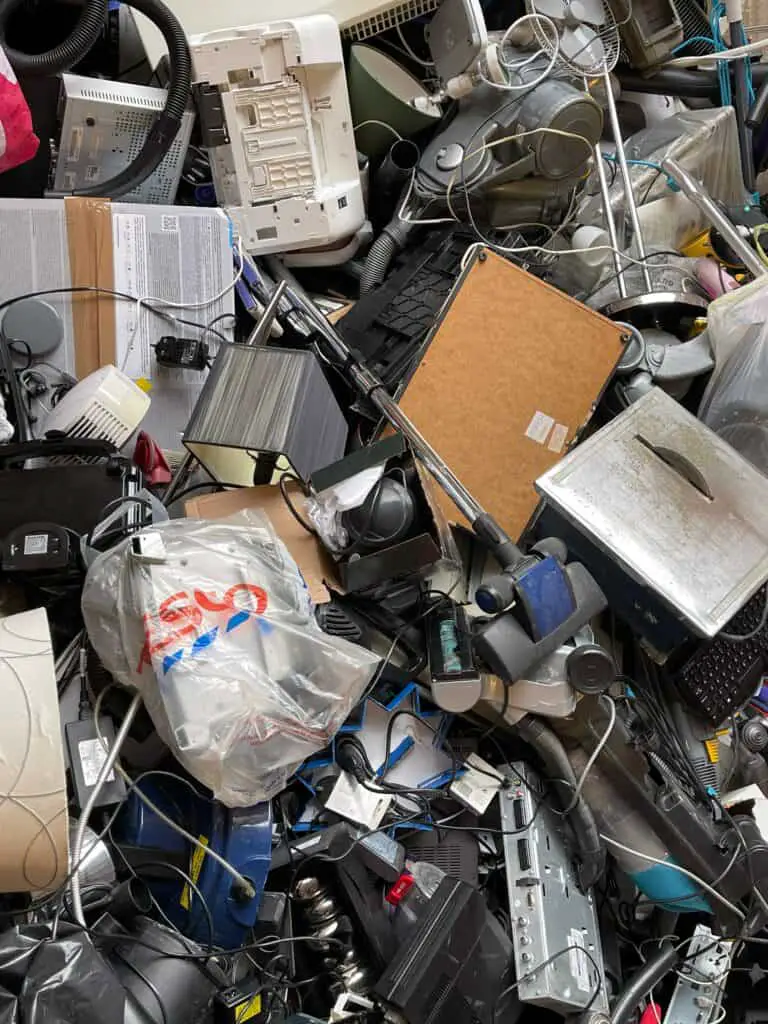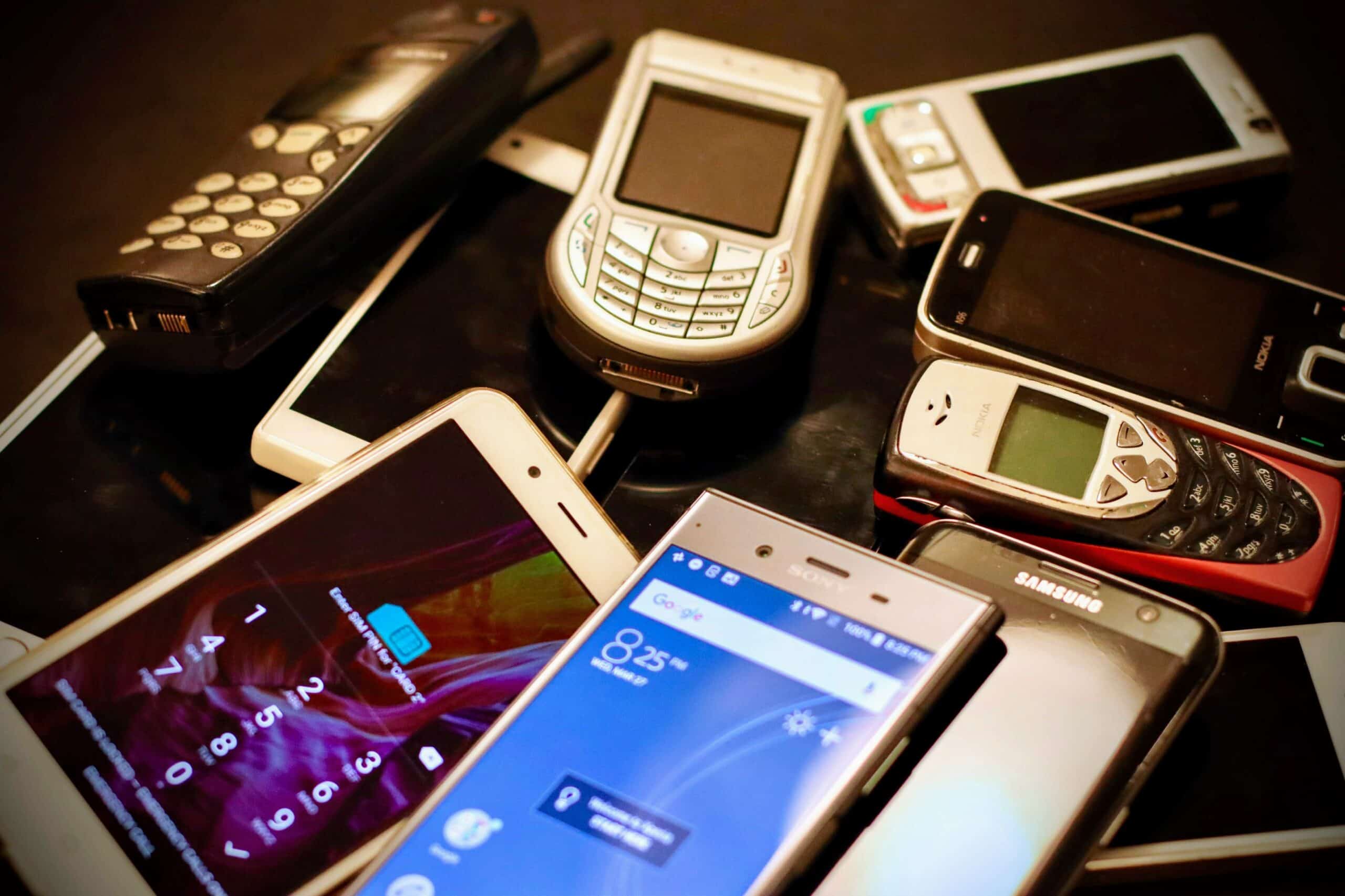We may earn money or products from the companies mentioned in this post.

Upgrade Haste Makes Tech Waste
The wisdom is that you ought to upgrade your computer, phone, or laptop about every two years. As great as this strategy is for getting consistent new tech into your life, it also results in a lot of waste. Waste that used to be computers, smartphones, and other doodads with microchips is called e-waste. Unfortunately, e-waste is hard to get rid of. Most computing equipment uses at least some plastic and a host of unusual, often toxic metals. But if they’re such an environmental problem, why not recycle them?
Tech Makes Waste
Every consumer should know about product cycles. That’s the amount of time where buyers can be expected to replace their stuff. For laptops, it’s 18-24 months. This is not completely because of consumer demand. Sometimes, tech companies goose these cycles by releasing new products instead of updating old ones. After all, it’s profitable to keep the same people buying a near-identical computer every two years.
So, let’s math out how much waste that might be per person. We’ll assume that our example buys a new phone every two years between the ages of twelve and 100. That person would throw away 44 phones over their life! Never mind all the laptops, headphones, and other shiny gadgets they’d trash too. Remember that gadgets tend to come in groups. After all, if you get a smartphone, you also need Bluetooth headphones to go with it. Maybe you’ll even get a smartwatch. All of it will eventually become e-waste.
Generally, there’s not much of a resale market for old technology. When it ages, it can’t support flashy new software and new hardware accessories. There’s not much of a future for old phones either. Any way you look at it, tech makes lots and lots of waste. The problem is only getting worse as more and more of the world can afford – and demand – a brand-new phone every other year.
 Why Recycle?
Why Recycle?
Computers use a ton of odd materials. Processor chips, for example, use gold components. Lesser-known minerals like dysprosium, which shows up in magnets, are valuable, too. Mining for rare earth metals generates toxic waste and is often a human rights controversy to boot. That’s a big reason that people want to recycle computing equipment. Another is that we’re slated to start running out of these minerals fairly soon. They don’t call them rare for nothing!
E-waste is toxic, too. It stunts the growth of children and hurts people in waste industries. Third-world countries with loose environmental rules often experience these effects firsthand. That’s where a lot of discarded electronics end up incinerated in open-air fires. Then, of course, there’s the sheer amount of tech garbage we’re making. Since 2010 alone, humans Third-world worldwide have generated 441.6 million tons of e-waste. Piling anything up that much is bad for both the environment and the humans who depend on it. So, what can we do? Recycle, that’s what!
Ways Tech Gets Recycled
There are already ways to recycle iron, copper, and other common materials from dead computers. The process involves shredding the computer and separating out metals with magnets. (Plastic gets recycled on its own.) In fact, Recycle Nation claims that only 2% of a computer cannot be recycled. E-waste recycling is a growing business, too. Its global market may exceed $65 billion by 2026.
Ways Tech Doesn’t Get Recycled
Doesn’t that sound great? The world is on its way to a beautiful recycled-computer future! Unfortunately, that’s a little optimistic. People who know about how plastic recycling actually goes won’t be surprised at how computer recycling is going. Not only was just 20% of e-waste recycled in 2018, but even Apple’s iPhone-recycling robot couldn’t possibly have kept up with the rate of consumption. Considering that e-waste contains lead and mercury, it’s no wonder that nobody wants to handle it. Passing it on to countries so broke that they need to accept e-waste for cash isn’t just bad for the citizens of those nations. It’s also giving one of our worst recycling challenges to governments and economies that aren’t prepared to deal with it.
As with many other “green” compromises, recycling costs. It’s currently not possible to dump your computer in a bin and put it outside for municipal recycling. Instead, you’ve got to call up an e-waste company. If you have a lot of tech to trash, they might give you a good bulk rate. Even so, if you’re strapped for time and cash, it’s a step you may not be able to take. Most of the customers of e-waste companies seem to be other businesses. This may be because they want to dispose of dozens of computers at a time, making a bulk rate worthwhile.
The Future of Tech Recycling
There are a few ways to improve this state of affairs. The first is to research more efficient removal of rare earth elements from computers, which scientists are hard at work on already. Another is to actually recycle more computers. Too many end up piled up in dumps far away from where the normal users of that technology live. They end up out of sight and out of mind to Samsung’s target sales demographic. This is an untenable health crisis for people who have to live with discarded e-waste. Tech users in wealthier nations also don’t get a chance to see why we need computer recycling.
Finally, tech users can change their behavior. The way to prevent e-waste is to embrace refurbishment, restraint, and reuse. Using repair services can lengthen the life of a computer by years. Users can also coax their aging machine further into longevity with a little bit of elbow grease. Even amateurs might be surprised at what they can repair on their home computer! This is especially true if the owner is willing to abandon an expensive, update-heavy OS like Windows in favor of lean, free Linux builds. Then there’s the growing Right to Repair movement. Its goal is to make manufacturers engineer new products to be more repairable. And let’s face it: sometimes we make technological impulse buys that don’t really improve our lives. Sure, new phones are fun. But maybe it’s time to think about whether we all need a new one every two years.
Conclusion
E-waste recycling will continue to become more sophisticated as the world becomes more and more digital. The question on our minds is whether that sophistication will catch up with the need for it. So far, the answer appears to be no. Even so, humankind has overcome other seemingly impossible waste problems. The future may hold great things for computer recycling. For now, though, our best bet might be just to throw out less techy stuff.
You Might Like – https://www.thefullbyte.com/2022/07/02/the-digital-divide/

